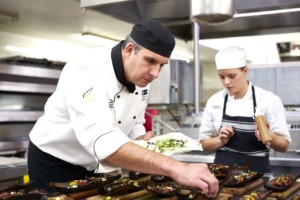
By Glenn Fulcher
The pessimistic view of the hospitality industry these days is that the outlook is bleak, but in reality we have an opportunity to reinvigorate this vital part of our local economy.
The COVID-19 pandemic has made things tougher, and it is always upsetting to see restaurants and pubs closing down. However, the nature of hospitality is that you will always see establishments shutting their doors. Maybe COVID-19 has just hastened the process in some cases.
COVID-19 has certainly forced the good operators to get better at what they do and to get smarter in how they position their business.
They have had to diversify and work through all the new regulations to ensure that they can still operate in some way at each different Alert Levels.
One of the biggest problems some of them have faced has been not being able to hire staff at will. We used to have a steady stream of international travellers who would work their hearts out for a few months and then move on, to be replaced by other backpackers.
As a result, the hospitality industry has relied on a transient workforce that has dried up as a result of the pandemic. The on-tap stream of foreigners made us all complacent and the closure of our borders has compelled owners to be smarter in the retention of staff.
I am hearing more stories of owners starting to give percentages of their business to key staff as a way of holding on to them, because it creates “buy-in” to how successful businesses operate. This is very important because the talent pool is very small, and we can’t seem to recruit enough.
Statistics show that there are currently fewer secondary school leavers than normal. This is something that normally happens in a five to six-year cycle, but New Zealand’s current low unemployment rates is simply adding to this problem.
We are also seeing a larger percentage of school leavers learn a trade because that’s where the money is perceived to be these days. Builder are doing well in the current environment and good on them, but it does not help our industry. We need to make this a fun and exciting career for youngsters to pursue straight from school.
Losing the international workforce has had a huge impact and now we simply have to look at ways to attract new talent and, in particular young learners, into our restaurants and kitchens.
By my calculation, there are five job opportunities for every one of the current learners in our School of Hospitality and Tourism at EIT; jobs that would suit them. The demand for good staff is great and we need to meet those needs.
We have always had a diverse mix of learners at the School of Tourism and Hospitality. However, there has been a change over the years. While we still have the school leavers, we are now also attracting those who have worked for a few years and even more mature learners who have changed career to follow their passion. The growth in learners needs to come from those school leavers.
The increase in mature learners has in turn, resulted in a change to the types of programmes we offer. For many years we had traditional qualifications because that was where the demand was. While those qualifications are important, more recently we have also had to design a diverse range of programmes that fit in with learners’ lives.
An example of this is our new part-time cookery programme, which is aimed at people with at least two years’ industry experience. They come to us one day each week for two years and then emerge with a New Zealand Certificate in Cookery (Level 4).
We believe there will be huge growth in this area. Owners realise they need to invest in their younger staff and a two-year part-time programme is a great way to lock them in, help them grow with the business and earn money while they are learning.
Part of our adaptability at EIT has been growing online learning like our new Food Costing micro-credential. We have also simplified enrolment for our short courses like barista and food safety. All you need to do is buy a ticket online and you are enrolled.
Not only are we adding to the ways we offer short courses and programmes, but we have also diversified the content. For example, we now offer a plant-based cookery programme.
It is all part of our role to serve the Hawke’s Bay hospitality sector and provide a stable and skilled workforce.
There are many opinions out there on the best way to revitalise our industry and although there is no magic bullet, I do believe adaptability and diversification is the key. The industry needs to continue to rethink how it employs and incentivise staff. In a tight employment markets this has to be one of the keys to retaining staff. EIT is also committed to adapting and diversifying to support the training needs of the sector and grow the workforce.
If fine dining establishments like Craggy Range and Mission Estate can start takeaway services during lockdowns, then anything is possible.
We just need to grow our workforce and the way to do that is to encourage youth to see hospitality as a career not just a job.
- Glenn Fulcher is the Head of EIT’s School of Tourism and Hospitality and the English Language Centre.
